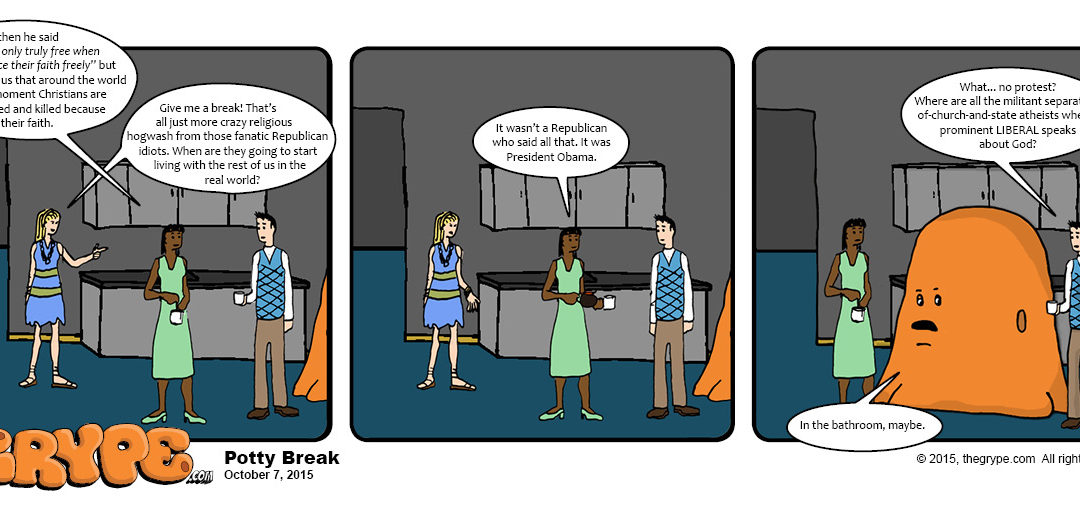 Religion versus Science, Part Two:
Religion versus Science, Part Two:
Look: it’s pretty easy.
Science is a means by which we attempt to classify, measure, and understand those things which we currently have the ability to measure, at any given point in time.
Metaphysics— including religion— is a means by which we attempt to classify, measure, and understand those things which we currently DO NOT have the ability to measure, at any given point in time.
Metaphysics will always be separate from science, and it will always go ahead of it, providing a philosophical framework for the human understanding of the meaning of existence.
Religious wars or conflicts between religions, or between theism and atheism, are almost always based in ignorance of the above process and are founded upon the false assumption that we are for some unknown reason supposed to stop learning and just defend the rationale we already have (be it scientific, philosophical, or religious) in perpetuity, forever. Just because. In short, any such conflict is a defense of ignorance and an attempt to halt further acquisition of knowledge in all three areas.
Such conflicts tend to get ugly because ignorance always turns violent when it runs out of excuses.
Meanwhile science is a process, NOT a finished product. And it isn’t like art, where your opinion matters. Science doesn’t care about what you “like” or “don’t like.”
You may choose to believe that scientists are wrong when they say a bullet to your heart or brain can kill you, or when they tell you that gravity will cause you to fall to your death if you step off a 10 story building. But it would be foolhardy to put your mistaken belief to the test. Unless you insist. In which case, go for it. There’s a Darwin Award at the ready, with your name on it.
And NO, I do not need to automatically respect your point-of-view or grant it even the TEENIEST amount of attention or credence. Not if it has been repeatedly proven false, and is directly contradicted by all of the vetted, peer-reviewed evidence.
Just because a group of people agree to ignore the actual measurable factual evidence DOESN’T MAKE IT SO. And even if huge numbers of people all decide to support a disproven fallacy STILL doesn’t give it one iota more credibility, or make it any less ridiculous.
Religion is the process whereby mankind attempts to better understand how the unperceived universe works. In this effort, it should refine itself and correct itself according to new evidence as it appears.
The best and newest science has begun to demonstrate the connection between the atomic universe (what we can see) and the subatomic universe (what we cannot see). Mechanisms are being discovered that explain how the unseen interacts with us on a subatomic (spiritual?) level and alters measurable qualities of the perceptible universe.
Both spheres of reference— science and religion— have traditionally been based, historically, upon the best evidence available at the time their precepts are written down.
Various “fundamentalist” movements in various religions (and national philosophies) are based upon reductive reasoning and utilizing blind faith as a mental tool whereby its proponents can ignore evidence as it appears on the scene, and strictly adhere to specific interpretations from the past, despite further developments that add to our understanding. These movements are therefore exercises in willful ignorance— sticking ones fingers in one’s ears and closing one’s eyes and going “la la la la” to drown out any new evidence that forces one to re-interpret the tenets drawn from ones’ religious (or national) source works and pretending that evidence does not exist.
Such fundamentalism is a relatively new thing in world religion, coming to prominence only over the past 100 years or so. Before that, fundamentalists were classified as “cultists” who invented their own static interpretation in defiance of adaptive doctrine.
Dogma (religious or political) is the body of rules that build up around the accepted ideology of a particular group in a particular time and place, which then resists acceptance of new evidence by clinging to out-dated notions. But ultimately these dogmas tend to fall apart if the attached religious belief-set wishes to survive and remain relevant in light of new evidence. The Catholic church has a decent record of fighting to slay the demons of its own past dogma. Vatican II is a prime example.
In religion, as in science, ultimately the stupid trappings and misinterpretations of an outdated time will tend to fall away until only rabid fundamentalists and paranoid zealots continue to stubbornly hold onto them.
Religion is NOT in and of itself a reflection of the will of the divine. It is MAN’S interpretation of the will of the divine, though any power-hungry false prophets who purposely misuse it (or who want you to give them your money) will of course refuse to admit that.
It’s strange how the human mind works under pressure. People seem seriously determined to blame God (or any number of external excuses) for a lot of awful shit that ultimately comes down to free will, or to the occasional random occurrence that is naturally part of a system so big we cannot begin to define or imagine it.

